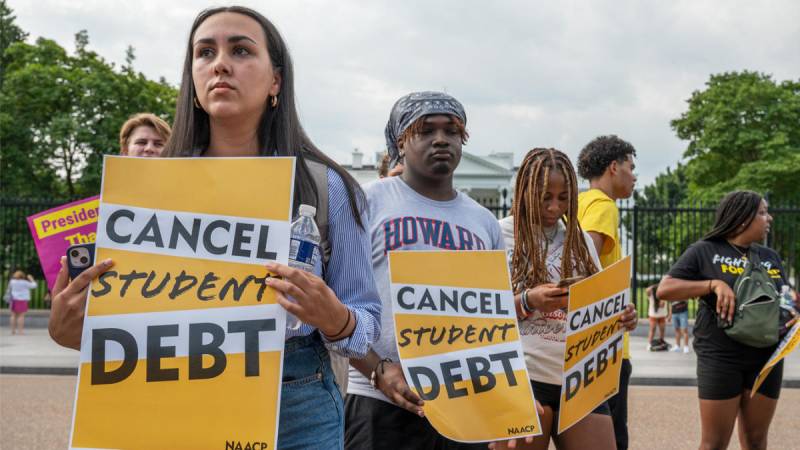Biden's student debt relief imperiled by conservative Supreme Court

Stay tuned with 24 News HD Android App

President Joe Biden's effort to cancel close to $400 billion in student debt appeared under threat Tuesday in a hearing at the conservative-dominated US Supreme Court.
A majority of the justices indicated in arguments presented Tuesday that they believe Biden exceeded his powers by adopting the costly program without specific authorization from Congress.
Their eventual ruling in the case brought by conservative states could have a huge impact on millions of US households stuck paying for university costs years and even decades after finishing their education.
Chief Justice John Roberts said the case raises "extraordinarily serious" issues about the separation of powers between the executive and legislature.
"Congress shouldn't have been surprised when half a trillion dollars is wiped off the books" by Biden's policy, he said.
If student debt is such an important issue and Congress hasn't addressed it, he said, it could be a "good lesson" for the president to not act on his own.
- Costly universities -
But outside the court, students who went heavily into debt to pay tuitions at the world's most expensive universities said they need relief.
Omamus Ogheni, just 20, already owes $31,000 for his studies toward a neuroscience degree at University of Virginia.
"It's a very precarious state to be in," he said.
"It's not allowing us to progress in our futures, in our careers, because we have this overwhelming burden that we have to climb," he said.
Nearly 43 million Americans hold $1.6 trillion in federal student loans, and some end up repaying them over decades as they start jobs and families.
Biden's plan for cutting debts came on the back of student loan payment freeze instituted by his predecessor Donald Trump during the Covid pandemic.
With loan payments still frozen, in August he offered up to cancel up to $20,000 of student debt for low and middle income earners, with the amount dependent on a person's income.
Based on the number of applications, the federal bill for that would add up to around $400 billion.
- More defaults? -
The policy was challenged from two angles: by a coalition of Republican-led states who called Biden's move an abuse of his power over taxpayers' money, and by two students ineligible for the maximum benefits of debt reduction who call the policy unfair.
The states say the 2003 law used by the Biden administration only permits freezing loan payments, not slashing the amount owed.
Jim Campbell, arguing for one of the states, said Biden undertook the policy only after failing to get legislation through Congress.
But arguing for the Biden administration, Elizabeth Prelogar told the court that ending the loan payment freeze without added loan relief will produce an immediate surge in loan delinquencies and defaults.
The 2003 law was invoked for loan forgiveness "to ensure that this unprecedented pandemic does not leave borrowers worse off in relation to their student loans," she said.
- Major questions doctrine -
A ruling against Biden could strengthen the legal view that a president cannot act on what are seen as "major questions" of governance without Congressional legislation -- even if Congress itself is politically paralyzed.
The court used this "major questions doctrine" last June to restrict the powers of the Environmental Protection Agency in its fight against global warming.
Progressive judge Ketanji Brown Jackson warned this stance could render the entire government hamstrung and dysfunctional.
The court's progressive justices, possibly supported by conservative Amy Coney Barrett, argued that the conservative states had no real standing to bring the case -- that they incurred no injury or harm themselves from Biden's policy.
The same view held for the two student plaintiffs -- that they were not injured by the policy.
The court is expected to deliver its ruling by the end of June.
